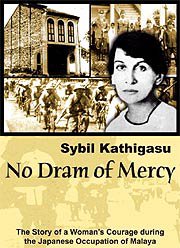Sybil Kathigasu's memoirs being reprinted
 The classic and once immensely popular memoirs of Ipoh’s World War Two resistance heroine Sybil Kathigasu titled No Dram of Mercy is being reprinted and will be available in a month's time
The classic and once immensely popular memoirs of Ipoh’s World War Two resistance heroine Sybil Kathigasu titled No Dram of Mercy is being reprinted and will be available in a month's timeNo Dram of Mercy was first published in London in 1954 by Neville Spearman and reprinted in Singapore in 1983 by Oxford University Press (OUP). Last year, the English original was translated into Chinese and published for the first time in Kuala Lumpur by Prometheus Enterprise.
Sybil Kathigasu (1900-1948), a Eurasian Malayan, was the wife of Dr AC Kathigasu who operated a clinic at No 141, Brewster Road in Ipoh. Days before Japanese troops occupied Ipoh on Dec 26, 1941, the family escaped to the nearby town Papan. Japan began to land troops on Peninsular Malaya on Dec 8, 1941 at the Sabak Beach in Kota Baru, Kelantan.
While staying at a shop house at No 74, Main Road, Papan, the British loyalist Sybil Kathigasu secretly kept shortwave radio sets and clandestinely listened to BBC broadcasts to be kept informed of the situation around the world, especially in Britain and Europe. Those acts were considered criminal and highly subversive by the military administration of Japan in Malaya.
Later, she also secretly supplied medicines, medical services and information to the underground communists and guerilla forces of the 5th Independent Regiment of the Malayan People’s Anti-Japanese Army (MPAJA) fighting against the occupation in nearby hills and jungles.
Sybil Kathigasu and her husband were eventually arrested in 1943, severely tortured and ‘convicted’. They were jailed until the liberation of Ipoh by communist partisans in August 1945.
She was then flown to Britain for medical treatment. There, she began to write No Dram of Mercy and was awarded George Metal in Buckingham Palace by the King of the United Kingdom.
As a result of the injury sustained during her incarceration, Sybil Kathigasu passed away in 1948 in Britain but, to fulfill her last wish as a Malayan, her body was flown back to Ipoh and buried at the Catholic cemetery besides the St. Michael Church.
Besides detailing her own clandestine activities in Papan and torture in Ipoh, Sybil Kathigasu also outlined the socio-cultural landscape and wartime atmosphere in the Ipoh-centered Kinta Valley during the 1940s.
She also vividly recorded the pre-occupation bombing in early and mid-December 1941 as well as the liberation of Ipoh in August 1945. Last year, the Chinese translation of No Dram of Mercy was launched in Kuala Lumpur and Ipoh where a memorial service was also held in her honour. 2005 was the 60th anniversary of the end of the Pacific War and the liberation of Malaya, Sabah, Sarawak and Singapore.
* Prometheus Enterprise can be contacted through Mr. Ong Chong Lim whose handphone number is 012-3103300
A critical study of Japanese rightwing ideology & groupings
http://www.seas.ac.uk/Research/SEWP/Vol2/PGConf/Wakisaka.pdf
Children of Far East prisoners of war
http://www.cofepow.org.uk/pages/appeal.html


<< Home